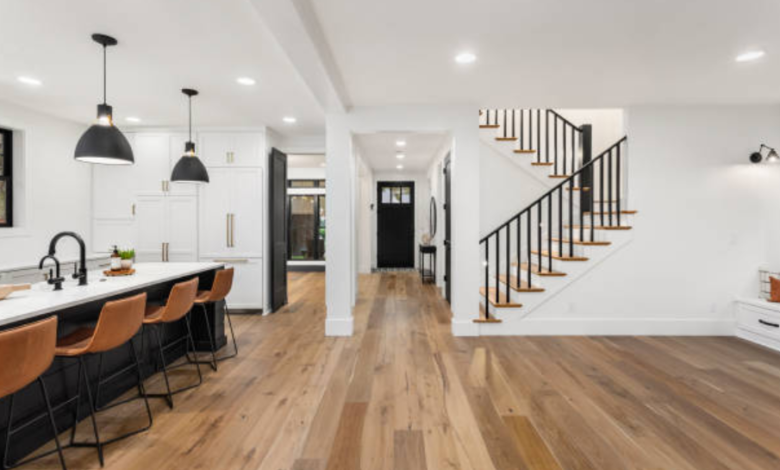Maximize Home Value with High-Quality Floor Installation Services

Upgrading a home can significantly enhance its value, functionality, and aesthetic appeal. One of the most effective ways to achieve these goals is through floor installation. High-quality flooring improves comfort, adds style, and can greatly increase the resale value of a property. Whether you are renovating an old home or building a new one, professional floor installation is a wise investment.
This article explores the benefits of quality flooring, types of flooring options, the floor installation process, popular design trends, and tips for ensuring a successful flooring project.
Why Floor Installation Matters
Enhances Home Aesthetics
The flooring in a home sets the tone for the entire interior design. Well-installed floors create a cohesive, stylish look that elevates the overall appearance of each room.
Improves Property Value
Investing in professional floor installation increases the resale value of a home. Potential buyers are attracted to durable, visually appealing floors that require minimal maintenance.
Increases Comfort and Functionality
Modern flooring materials provide comfort underfoot, improve insulation, and enhance acoustics, making your home more enjoyable and energy-efficient.
Ensures Durability
High-quality floor installation guarantees that the flooring will last for years, resisting wear and tear from daily activities.
See also: Small Home, Big Style: Space-Saving Design Trends
Types of Flooring for Modern Homes
Hardwood Flooring
Hardwood remains a popular choice due to its timeless appeal, durability, and ability to add value to a property.
Benefits of Hardwood
- Long-lasting and strong
- Easy to clean and maintain
- Enhances warmth and character of interiors
Popular Hardwood Styles
- Oak and maple for classic finishes
- Walnut and cherry for rich tones
- Engineered hardwood for stability and moisture resistance
Laminate Flooring
Laminate offers a cost-effective, durable alternative to hardwood while mimicking the appearance of natural wood or stone.
Benefits of Laminate
- Scratch and stain-resistant
- Easy to install and maintain
- Available in a wide variety of designs and colors
Vinyl Flooring
Vinyl flooring is versatile and suitable for high-traffic areas, kitchens, and bathrooms.
Benefits of Vinyl
- Water-resistant and durable
- Comfortable underfoot
- Wide range of textures, including wood and stone looks
Tile Flooring
Tiles are ideal for bathrooms, kitchens, and outdoor areas due to their water resistance and long lifespan.
Benefits of Tiles
- Available in ceramic, porcelain, and natural stone
- Easy to clean and maintain
- Durable and highly customizable in design
Carpet Flooring
Carpet offers comfort and warmth, especially in bedrooms and living rooms.
Benefits of Carpet
- Soft underfoot, ideal for family areas
- Reduces noise levels
- Available in many colors, textures, and patterns
The Floor Installation Process
Initial Consultation
A professional flooring contractor assesses the home, discusses preferences, and recommends suitable flooring options.
Measuring the Space
Accurate measurements ensure proper material estimation and reduce waste.
Material Selection
Choosing the right flooring material depends on the room’s purpose, budget, and desired style.
Preparation of the Surface
Proper preparation is crucial for a successful floor installation.
Subfloor Inspection
The subfloor is checked for moisture, damage, and levelness.
Cleaning and Repairing
Any issues are addressed to provide a stable foundation for the new flooring.
Installation Phase
The actual installation varies depending on the type of flooring chosen.
Hardwood and Laminate Installation
Boards are laid, interlocked, and secured for a seamless finish.
Vinyl and Tile Installation
Adhesive or click-lock systems are used to ensure durability and alignment.
Carpet Installation
Carpet is stretched and secured to avoid wrinkles or movement over time.
Finishing Touches
After installation, floors are cleaned, sealed (if necessary), and inspected for quality and alignment. Proper finishing protects the flooring and enhances its appearance.
Benefits of Professional Floor Installation
Expert Guidance
Professional installers offer advice on materials, layout, and maintenance to achieve the best results.
Precision and Accuracy
Expert floor installation ensures level surfaces, tight seams, and proper alignment, preventing future issues like warping or gaps.
Time and Cost Efficiency
Professional installation saves time, reduces material waste, and avoids costly mistakes.
Longevity and Durability
Correctly installed floors last longer, resisting daily wear and environmental factors such as moisture and temperature changes.
Popular Flooring Design Trends
Open Concept and Seamless Flooring
Installing uniform flooring throughout connected spaces creates a sense of continuity and spaciousness.
Mixed Materials
Combining hardwood, tile, and carpet in specific areas adds texture and visual interest.
Eco-Friendly Flooring
Sustainable materials such as bamboo, cork, and reclaimed wood are gaining popularity for environmentally conscious homeowners.
Patterned and Textured Floors
Chevron, herringbone, and geometric patterns add sophistication and uniqueness to modern interiors.
Neutral and Light Colors
Light-toned floors enhance natural light, making spaces appear larger and more inviting.
Tips for a Successful Floor Installation Project
Choose the Right Flooring Material
Consider durability, comfort, maintenance, and aesthetic appeal when selecting flooring.
Hire Experienced Professionals
Skilled installers ensure precision, quality, and efficiency throughout the project.
Plan for Future Needs
Think about potential family changes, pets, and lifestyle requirements when choosing flooring.
Maintain Your Floors
Regular cleaning, polishing, and preventive care extend the life of your floors.
Budget Wisely
Allocate funds for materials, installation, and any necessary repairs to ensure a smooth project.
Common Mistakes to Avoid
DIY Installation Without Experience
Incorrect installation can lead to uneven floors, gaps, and long-term damage.
Ignoring Subfloor Preparation
A poorly prepared subfloor may cause uneven surfaces, warping, or premature wear.
Choosing Style Over Function
Aesthetic appeal is important, but durability and suitability for the room’s use should come first.
Skipping Finishing Steps
Sealing, polishing, or trimming is crucial for protecting floors and achieving a professional look.
How Floor Installation Maximizes Home Value
Boosts Aesthetic Appeal
High-quality floors create a strong first impression for visitors and potential buyers.
Enhances Durability
Durable floors reduce the need for frequent repairs, making the home more attractive to buyers.
Supports Functionality
Well-installed floors improve comfort, safety, and usability, adding value to daily living.
Aligns with Modern Design Trends
Homes with contemporary flooring attract buyers who appreciate stylish and updated interiors.
Reduces Maintenance Costs
Professionally installed flooring requires less maintenance, which is a significant selling point for homeowners.
Conclusion
High-quality floor installation is a powerful way to maximize home value, enhance comfort, and elevate interior design. From hardwood to tile, carpet to vinyl, choosing the right flooring and professional installation ensures durability, functionality, and long-lasting beauty.
Investing in professional floor installation provides homeowners with stress-free results, improved aesthetics, and increased property value. By understanding flooring options, planning carefully, and hiring skilled installers, you can transform your home into a stylish, efficient, and valuable living space that meets your family’s needs for years to come.




